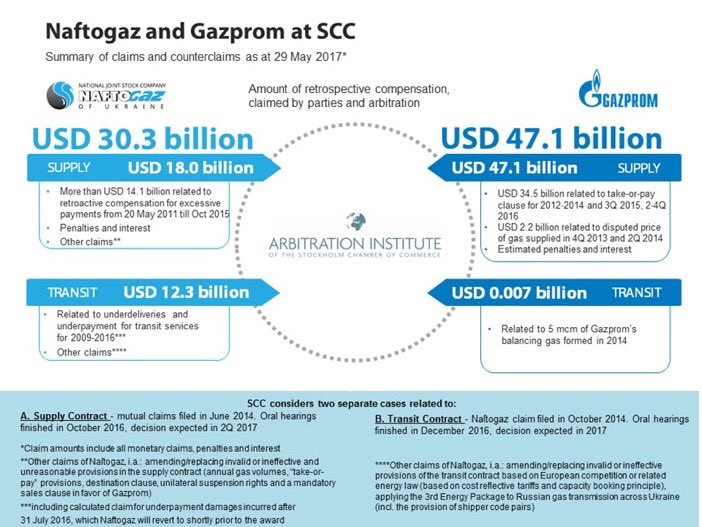A Stockholm arbitration judge denied a $45.7 billion claim from Gazprom today over a so-called “take-or-pay” agreement with Ukrainian oil and gas authority Naftogaz.
The ruling, issued by the Arbitration Institute of the Stockholm Chamber of Commerce, rejected the state-owned Russian gas giant’s argument that a take-or-pay clause in a contract signed between the two countries in 2009 forced Ukraine to pay for gas that it did not purchase from Gazprom.
Since Gazprom first moved for arbitration in June 2014, it has continuously raised the bill from the initial $4.5 billion demand for payment of undelivered gas and interest.
Naftogaz has filed its own counterclaims against Gazprom in the Stockholm arbitration court, alleging that the Russian gas supplier was overcharging. Those claims add up to $30.3 billion, as of a Naftogaz report from 2016.
If the Stockholm arbitrator had approved Russia’s claim, it could have dealt serious damage to a still-fragile Ukrainian economy.
The $45.7 billion amounts to around half of Ukraine’s gross domestic product, with a 2015 amount of $90.6 billion.
Naftogaz added in a series of tweets that the arbitration tribunal had ruled that Naftogaz was “entited to a market-reflective adjustment of the price formula” on the counterclaim. This would give a possible remedy to the company’s allegation that Gazprom was overcharging.

Naftogaz CEO Andriy Kobolev said that his company received a favorable ruling from the Stockholm Arbitration Institute in a $45 billion dispute with Gazprom.
“Fair to say that with this ruling, Russia’s ‘leverage’ over Ukraine has further eroded,” wrote Bluebay Asset Management analyst Timothy Ash in a research note.
Ash added that the overall impact could “cut Ukraine out of the gas transit business,” as Russia seeks to use alternative routes like the Nordstream and Turkish stream pipelines to move gas to European markets.
A Naftogaz spokeswoman declined to comment, other than saying that Director Andriy Kobolev had informed Interfax-Ukraine that Gazprom’s demands had been rejected.
Gazprom did not reply to a request for comment.
